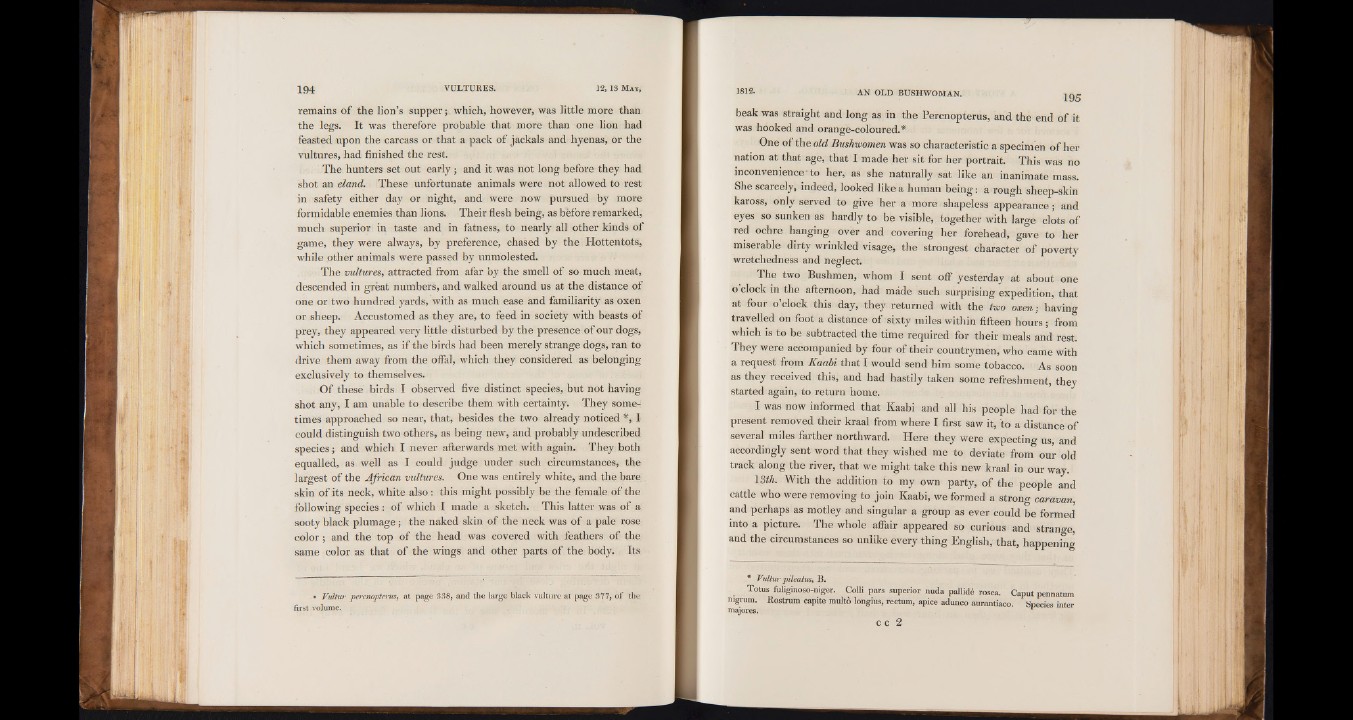
remains of the lion’s supper; which, however, was little more than
the legs. It was therefore probable that more than one lion had
feasted upon the carcass or that a pack of jackals and hyenas, or the
vultures, had finished the rest.
The hunters set out early ; and it was not long before they had
shot an eland. These unfortunate animals were not allowed to rest
in safety either day or night, and were now pursued by more
formidable enemies than lions. Their flesh being, as before remarked,
much superior in taste and in fatness, to nearly all other kinds of
game, they were always, by preference, chased by the Hottentots,
while other animals were passed by unmolested.
The vultures, attracted from afar by the smell of so much meat,
descended in great numbers, and walked around us at the distance of
one or two hundred yards, with as much ease and familiarity as oxen
or sheep. Accustomed as they are, to feed in society with beasts of
prey, they appeared very little disturbed by the presence of our dogs,
which sometimes, as if the birds had been merely strange dogs, ran to
drive them away from the offal, which they considered as belonging
exclusively to themselves.
Of these birds I observed five distinct species, but not having
shot any, I am unable to describe them with certainty. They sometimes
approached so near, that, besides the two already noticed*, I
could distinguish two others, as being new, and probably undescribed
species; and which I never afterwards met with again. They both
equalled, as well as I could judge under such circumstances, the
largest of the African vultures. One was entirely white, and the bare
skin of its neck, white also: this might possibly be the female of the
following species : of which I made a sketch. This latter was of a
sooty black plumage; the naked skin of the neck was of a pale rose
color; and the top of the head was covered with feathers of the
same color as that of the wings and other parts of the body. Its
* Vidtur percnopterus, at page 338, and the large black vulture at page 377, of the.
first volume.
beak was straight and long as in the Percnopterus, and the end of it
was hooked and orange-coloured.*
One of the old Bushwomen was so characteristic a specimen of her
nation at that age, that I made her sit for her portrait. This was no
inconvenience-to her, as she naturally sat like an inanimate mass.
She scarcely, indeed, looked like a human being: a rough sheep-skin
kaross, only served to give her a more shapeless appearance; and
eyes so sunken as hardly to be visible, together with large clots of
red ochre hanging over and covering her forehead, gave to her
miserable dirty wrinkled visage, the strongest character of poverty
wretchedness and neglect.
The two Bushmen, whom I sent off yesterday at about one
o clock in the afternoon, had made such surprising expedition, that
at four o clock this day, they returned with the two oxen; having
travelled on foot a distance of sixty miles within fifteen hours; from
which is to be subtracted the time required for their meals and rest.
They were accompanied by four of their countrymen, who came with
a request from Kaabi that I would send him some tobacco. As soon
as they received this, and had hastily taken some refreshment, they
started again, to return home.
I was now informed that Kaabi and all his people had for the
present removed their kraal from where I first saw it, to a distance of
several miles farther northward. Here they were expecting us, and
accordingly sent word that they wished me to deviate from our old
track along the river, that we might take this new kraal in our way.
13th. With the addition to my own party, of the people and
cattle who were removing to join Kaabi, we formed a strong caravan,
and perhaps as motley and singular a group as ever could be formed
into a picture. The whole affair appeared so curious and strange,
and the circumstances so unlike every thing English, that, happening
* Vidtur pileatus, B.
Totus fiiliginoso-niger. Colli pars superior nuda pallide rosea. Caput pennatum
nigrum. Rostrum capite multo longius, rectum, apice adunco majores. aurantiaco. Species in.ter
c c 2